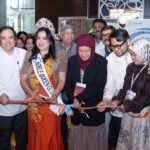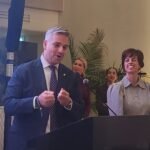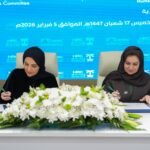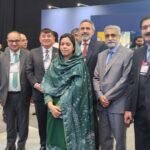21 Sept 2017 UN News Centre
Addressing the United Nations General Assembly today, Shahid Khaqan Abbasi, the Prime Minister of Pakistan underscored that any strategy to combat global terrorism must focus on addressing the issue of State sponsored terrorism, as well as resolve the root causes behind such violence.
“[Root causes] are not only poverty and ignorance, terrorism is even more an extreme response to real or perceived political and other grievances, including foreign intervention, oppression and injustice,” the Pakistani leader told world leaders.
“Unless such root causes are addressed, it will be difficult to counter the twisted narrative of terrorist groups,” he added.
In his address, Prime Minister Abbasi also drew attention to climate change as the new and existential threat to humankind’s future with its consequences felt around the world – from the United States to Nepal – and called on global leaders to collectively rally behind the Paris Agreement on Climate Change.
He also noted the importance of the Sustainable Development Goals (SDGs) for all of humanity and said that initiatives such as China’s ‘Belt and Road’ offered a clear path to prosperity as well as a model of South-South cooperation “worthy of emulation.”
Also in his address, he urged an international investigation mechanism be sent to Kashmir “to verify the nature and extent of India’s human rights violations,” identify the perpetrators and hold them accountable.
Further, urging for a just, peaceful and expeditious resolution of the dispute over Kashmir, Prime Minister Abbasi called on the Security Council secure the implementation of its own resolution on the region.
“To this end, the UN Secretary-General should appoint a Special Envoy on Kashmir [whose] mandate should flow from the longstanding but unimplemented resolutions of the Security Council.”
(Radio Pakistan)
Prime Minister of Pakistan, Shahid Khaqan Abbasi address to 72nd Session of General Assembly, United Nations
Mr. President,
Excellencies, Distinguished delegates, Ladies and Gentlemen
Let me first congratulate Mr. Miroslav Lajcak on his election as the President of the 72nd session of the General Assembly. I am confident that his long experience in public service and international relations will be an asset in successfully guiding this august Assembly to address the imposing challenges of security, development and governance that confront the world today.
Mr. President,
For over 70 years – despite the Cold War, the nuclear arms race and scores of regional conflicts – our world was able to avoid a global conflagration. This can be ascribed in large measure to the adherence by most States to the prohibition of the use or threat of use of force except under the authority of the UN Charter.
Unfortunately, the principles of the UN Charter have been progressively eroded in the new millennium. In recent years some countries have displayed a growing proclivity to resort to unilateral force and intervention against other States. Coercion and threats have emerged again as the main currency in the management of inter-state disputes and differences.
Renewed East-West tensions may engulf Europe in another Cold War. Peace and prosperity in Asia is threatened by emerging big power friction and rising tensions in South, East and West Asia.
The Middle East is wracked by war and violence – in Syria, Iraq, Yemen and elsewhere. Although Daesh appears to have been weakened in Iraq and Syria, terrorist violence has spread and intensified across the Middle East and Africa and other parts of the world.
There is no end in sight to the tragedy of Palestine. Israel’s prolonged occupation and expansion of illegal settlements may lead to renewed and wider violence in the Holy Land.
The legitimate struggle for self-determination of the people of Jammu and Kashmir continues to be brutally suppressed by India’s occupation forces.
Rising racism and religious hatred – manifested in xenophobia and Islamophobia – is erecting physical walls and psychological barriers between nations and peoples even as our world becomes increasingly interdependent.
The ethnic cleansing of Rohingyas is not just an affront to all norms of humanity but also challenges our collective conscience.
While the pillars of world order are being eroded, the imperative of international cooperation – to address poverty, disease, climate change, nuclear proliferation, terrorism and forced displacement – is intensifying.
Today, more than ever, we need the United Nations to provide the parameters, processes and platforms for global cooperation that is essential to address the wide ranging challenges to peace, security, and development.
Pakistan welcomes the efforts launched by Secretary General Antonio Guterres to revitalize the United Nations’ capabilities in Peace and Security, Development and Management.
We are also committed to reform that transforms the Security Council into a more representative, democratic and accountable body rather than an expanded club of the powerful and the privileged.
Mr. President,
Pakistan celebrated the 70th anniversary of its independence last month. This month marks the 70th anniversary of Pakistan’s membership of the United Nations.
Pakistan’s commitment to the principles of the United Nations is evident from the long record of its constructive role in the initiatives and contributions that have shaped the decisions and discourse at this world body on decolonization, development, trade, international law, human rights, refugees, peacekeeping, security, disarmament and the United Nations’ budget and management.
Pakistan has consistently been one of the world’s top troop contributors to UN peacekeeping. We will remain on the frontlines of peacekeeping and continue to offer professional and well-trained personnel to the United Nations, despite our own security challenges.
Mr. President,
Our adherence to the principles of the United Nations Charter flows from the declaration of our Founding Father, Quaid-e-Azam Mohammad Ali Jinnah who said: “Our foreign policy is one of friendliness and goodwill towards all nations of the world”.
Unfortunately, from day one of its creation, Pakistan has faced unremitting hostility from its eastern neighbor. India refuses to implement the unanimous resolutions of the UN Security Council, which mandate a UN supervised plebiscite to enable the people of Jammu and Kashmir to freely decide their destiny.
Instead India has deployed nearly 700,000 troops in occupied Kashmir to suppress the legitimate struggle of the Kashmiris to exercise their right to self-determination. This is the most intense foreign military occupation in recent history.
As in the past, today the Kashmiri people are waging a heroic and popular struggle to rid themselves of India’s oppressive rule. They come out in the streets daily to call on India to leave Kashmir.
India has responded with massive and indiscriminate force to suppress the Kashmiris, shooting indiscriminately at children, women and youth. Hundreds of innocent Kashmiris have been killed or injured. Shotgun pellets have blinded and maimed thousands of Kashmiris including children. These and other brutalities clearly constitute war crimes and violate the Geneva Conventions.
Pakistan demands an international investigation into India’s crimes in Kashmir. We ask that the United Nations Secretary-General and the High Commissioner for Human Rights send an inquiry Commission to occupied Kashmir to verify the nature and extent of India’s human rights violations, secure the punishment of those responsible and provide justice and relief to the victims.
Pakistan also urges the international community to call on India to: halt pellet gun attacks and other violence against unarmed demonstrators; stop the use of rape as an instrument of state policy; end media blackouts; rescind its draconian emergency laws; and free all Kashmiri political leaders.
Mr. President,
To divert the world’s attention from its brutalities; India frequently violates the ceasefire along the Line of Control in Kashmir. Despite over 600 violations since January this year Pakistan has acted with restraint. But if India does venture across the LoC, or acts upon its doctrine of “limited” war against Pakistan, it will evoke a strong and matching response.
The international community must act decisively to prevent the situation from a dangerous escalation.
Mr. President,
The Kashmir dispute should be resolved justly, peacefully and expeditiously. As India is unwilling to resume the peace process with Pakistan, we call on the Security Council to fulfill its obligation to secure the implementation of its own resolutions on Jammu and Kashmir.
To this end, the UN Secretary-General should appoint a Special Envoy on Kashmir. His mandate should flow from the longstanding but unimplemented resolutions of the Security Council.
Mr. President,
Let me reiterate, Pakistan remains open to resuming a comprehensive dialogue with India to address all outstanding issues, especially Kashmir and discuss measures to maintain peace and security. This dialogue must be accompanied by an end to India’s campaign of subversion and state sponsored terrorism against Pakistan, including from across our western border.
Mr. President,
Apart from the people of Afghanistan, Pakistan and its people have suffered the most from four decades of foreign intervention and civil wars in Afghanistan. These wars have
blighted our country with the flow of extremists and terrorists, guns and drugs as well as an influx of millions of refugees. They have set back our economic development by decades. Even today, Pakistan is host to over 3 million Afghan refugees. No one desires peace in Afghanistan more than Pakistan.
From 16 years of the ongoing war in Afghanistan, it is clear that peace will not be restored by the continuing resort to military force. Neither Kabul and the Coalition, nor the Afghan Taliban, can impose a military solution on each other. The international community – as expressed in several United Nations resolutions – has concluded that peace can be restored in Afghanistan only through a negotiated settlement.
Having suffered and sacrificed so much due to our role in the global counter terrorism campaign it is especially galling for Pakistan to be blamed for the military or political stalemate in Afghanistan. We are not prepared to be anyone’s scapegoat. Taliban “safe havens” are located not in Pakistan but in the large tracts of territory controlled by the Taliban in Afghanistan.
Yes, cross border attacks do occur. These are mostly conducted by anti-Pakistan terrorists from “safe havens” across the border. To end all cross border attacks we ask the Afghan government and the Coalition to support and complement Pakistan’s ongoing efforts to strengthen border controls and monitor all movement across it.
What Pakistan is not prepared to do is to fight the Afghan war on Pakistan’s soil. Nor can we endorse any failed strategy that will prolong and intensify the suffering of the people of Afghanistan and Pakistan and other regional countries.
Pakistan believes that the urgent and realistic goals in Afghanistan should be: One, concerted action to eliminate the presence in Afghanistan of Daesh, Al-Qaeda and their affiliates including the TTP and Jamaat-ul-Ahrar, which was recently declared a terrorist organization by the Security Council.
Two, promote negotiations between Kabul and the Afghan Taliban – in the Quadrilateral Coordination Group (QCG) or any trilateral format – to evolve a peaceful settlement in Afghanistan.
These two steps offer the most realistic prospect of restoring peace and stability in Afghanistan and our region.
Mr. President,
Pakistan’s counter-terrorism credentials cannot be questioned. After 9/11 it was Pakistani efforts that enabled the decimation of Al-Qaeda. Pakistan’s military campaigns have succeeded in clearing our tribal areas of almost all militant groups.
We took the war to the terrorists. We have paid a heavy price. Over 27,000 Pakistanis including 6,500 military and law enforcement personnel have been martyred by terrorists. 50,000 Pakistani nationals have been injured, including 15,000 army personnel, many of whom have lost their limbs.
Mr. President,
We have fought the war against terror with our own resources. Pakistan’s economic losses are estimated at over $120 billion. Yet, we remain committed to fully implementing our National Action Plan against terrorism and extremism. Defeating terrorist violence is vital to realize our overriding priority of rapid economic and social development.
Mr. President,
Terrorism is now a global phenomenon, which must be addressed comprehensively. We see two major gaps in the global counter-terrorism strategy. First, the international community has failed to address the issue of state sponsored terrorism. This is an instrument of choice of the agents of chaos and aspiring hegemons. In several regions, stability will be difficult to restore unless State sponsored terrorism is condemned, prohibited and punished.
Second, to eliminate terrorism, its root causes must be addressed. These are not only poverty and ignorance; terrorism is even more an extreme response to real or perceived political and other grievances, including foreign intervention, oppression and injustice. Unless such root causes are addressed, it will be difficult to counter the twisted narrative of terrorist groups.
Mr. President,
Confronted by a hostile and increasingly militarized neighbor, Pakistan has been obliged to maintain the capability for credible deterrence. My country developed nuclear weapons only when these were introduced in our region by this neighbor. Our strategic assets are vital to deter oft-threatened aggression. They are tightly and effectively controlled, as has been widely acknowledged by experts. The world community would be well served by enabling Pakistan to join global non-proliferation arrangements, such as the Nuclear Suppliers Group on a non-discriminatory basis.
Mr. President,
Climate change poses a new and existential threat to mankind’s future. Extreme climate events are multiplying: Their consequences – flooding in Texas, landslides in Nepal and Sierra Leone, devastation in the Caribbean and Puerto Rico, disappearing Himalayan glaciers – are global and indiscriminate. As one of the most vulnerable states to climate change, we believe that it is in our collective interest to pursue and realize the goals of the Paris Agreement and build a new and greener model for growth and development.
Mr. President,
Growth and development remain the primary objectives of the developing countries. The United Nations’ Sustainable Development Goals represent the most ambitious development agenda in history. The development challenge has become more imposing due to the combined constraints of climate change, rising protectionism, fraying international cooperation and proliferation conflicts.
The vision of shared growth – spelt out in Chinese President Xi Jinping’s Belt and Road initiative – offers a solid path to prosperity and a model of South-South cooperation worthy of emulation.
Mr. President,
Pakistan’s economy has recorded a remarkable revival in the past four years. The China-Pakistan Economic Corridor (CPEC) will further contribute to our economic upsurge. This will expand exponentially as the Pakistan-China partnership extends beyond energy and transportation to many other sectors.
Pakistan’s integration into the Eurasian Belt and Road network will provide a firm foundation for Pakistan’s rapid economic development. With a youthful population of 207 million people, we are confident that an economic strategy anchored on rising incomes, consumption and production will propel Pakistan towards greater prosperity.
To achieve these priority goals for our people, Pakistan seeks to build peace within our country and security around our borders. We seek good relations with all States on the basis of sovereign equality. We will respond positively to all offers of friendship and cooperation.
Mr. President,
We are poised at a critical inflection point in history. The world order that has prevented a global war for over 70 years is under threat. Yet, revolutionary advances in science and technology, the immense capacity for global investment, production, consumption and trade, especially in the developing countries, and the availability of structures and mechanisms for collective action offer an opportunity, unprecedented in human history, to address the diverse challenges that we face today. It is here, through the United Nations, that the peoples of the world can seize the opportunities to achieve our shared vision of a more just, peaceful and prosperous world.
I thank you, Mr. President!









